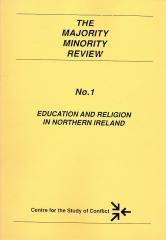  Centre for the Study of Conflict
Centre for the Study of ConflictSchool of History, Philosophy and Politics, Faculty of Humanities, University of Ulster
Centre Publications
[Background] [Staff] [Projects] [CENTRE PUBLICATIONS] [Other Information] [Contact Details] [Chronological Listing] [Alphabetical Listing] [Subject Listing]
Majority Minority Review 1: Education and Religion in Northern Ireland
by A M Gallagher A second edition of this publication was produced in 1995 under the title The Majority Minority Review 1: Education in a Divided Society and is also featured on this site, including a full bibliography. Out of Print
Majority Minority Review 1 by A M Gallagher
Centre for the Study of Conflict
The Majority-Minority Review is a series published by the Centre for the Study of Conflict, University of Ulster. The series will review published research on the comparative material conditions of the two communities in Northern Ireland. This first issue of the Review focuses on education. Future issues will examine research evidence on employment and unemployment, the administration of justice, and housing. The aim of the series is to provide an impartial commentary which will inform readers of up-to-date research findings and enable them to monitor developments over a period of time. The Centre for the Study of Conflict has a long-term commitment to publish the review. The educational system in Northern Ireland can be divided into primary, secondary and tertiary levels. In addition there is a limited pre-school nursery provision. Locally, the primary and secondary levels are serviced by five Education and Library Boards. Centrally, the overall system is administered by the Department of Education for Northern Ireland (DENI). In addition, a Council for Catholic Maintained Schools has been established and is to be given a legislative basis. In practice there are two parallel Systems for Protestants (and other non-Catholics) and Catholics at the primary and secondary levels, and in teacher-training colleges. It is important to note that the Catholic school system is not viewed, by Catholics, as inferior. Rather, the right to separate schools is vigorously defended by the Catholic Church. Given this de facto situation, and for the sake of clarity, the nomenclature used throughout this review is of 'Protestant' and 'Catholic' schools, even where the official designations do not make this distinction. In appropriate sections of the Review the definition of a Protestant and a Catholic school is made clear and evidence to justify this categorisation is presented. Each Review will be advised and instructed by a team of consultants. The Centre wishes to record its thanks to the following consultants who commented on an earlier draft of the Education Review:
John Wilson, Northern Ireland Council for Educational Research Return to publication contents
Last Modified by Martin Melaugh : | ||||||||||||||||||||||||||
